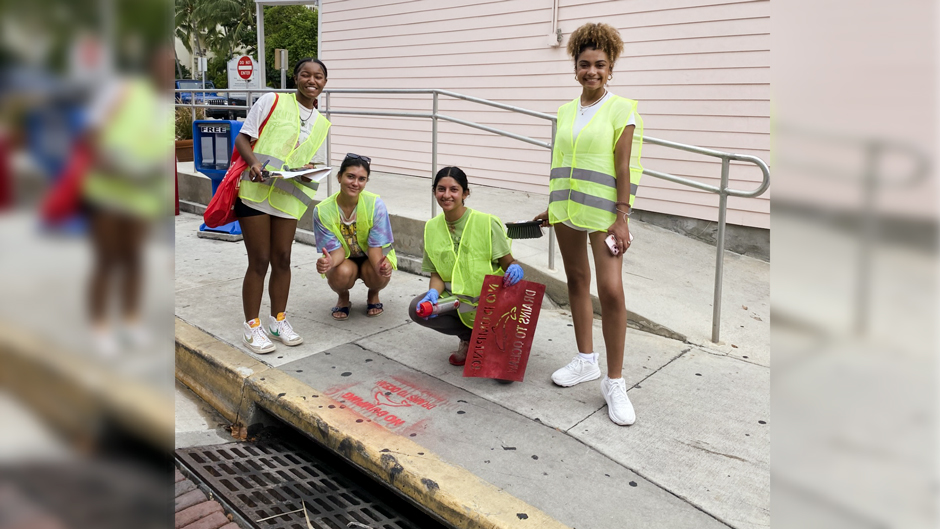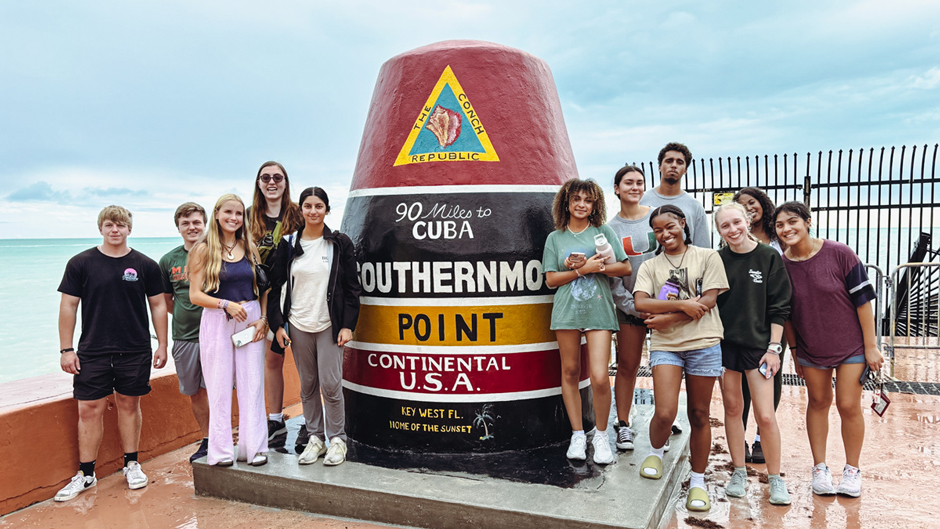During Fall Break, University of Miami students took action to protect Key West’s marine environment by removing 295 pounds of trash from its shoreline and marking 106 storm drains that lead directly to the ocean, raising awareness about pollution while collaborating with local partners Coast Love and Reef Relief.
The group focused their efforts on the shoreline and urban areas where storm drains lead directly to the ocean, posing a risk to marine life. University of Miami Alternative Breaks (UMAB) selected the environmentally focused project in response to student interest in environmental service, with the goal of making an impact on the local ecosystem and educating participants about the consequences of pollution in coastal areas.
Led by UMAB co-president Nicole Yakovlev, the students spent three days tackling pollution on the island.
“Seeing the trip come to life after months of planning was incredibly rewarding,” Yakovlev said. “I’d never done a beach cleanup before, so it was a great opportunity to experience a new type of volunteering.”

For many of the students, like Yakovlev, it was their first experience with a beach cleanup.
“It was eye-opening to see the amount of debris that ends up in the ocean and the direct impact it has on marine life,” Yakovlev said. The project also offered educational moments, such as learning how unfiltered storm drains can carry pollutants into the ocean, where they endanger fragile ecosystems. Despite the physical challenges of working under the hot Florida sun, the students felt motivated by the immediate results of their efforts and the gratitude expressed by local residents and businesses.
Veronica Richmond, a junior double majoring in biology and creative advertising, has been involved in UMAB trips since her first year on campus, always opting for those centered on environmental justice.
“I’ve dedicated all my breaks to UMAB programs because they align perfectly with my passion for conservation,” she shared, adding that her experience as a site leader allowed her to ensure others had a meaningful trip.
Having grown up studying terrestrial ecosystems in Idaho, she was eager to learn more about coastal environments in the Florida Keys, particularly while marking storm drains.
“Many locals thanked us for redoing the labels. It was heartwarming to know our work was appreciated and encouraging people to be more mindful,” she said.
Sydney Armstrong, a junior majoring in health science, was excited to take on a new challenge during the Key West beach cleanup.
“I usually volunteer in soup kitchens, so I wanted to try something different,” Armstrong shared. “The most rewarding part was seeing the amount of garbage we picked up alongside other volunteers—over 940 pounds from Boca Chica Beach. It was motivating to be part of a larger group, with around 50 other volunteers joining us.”
Armstrong also noted that the experience opened her eyes to Key West's environmental issues, like the way saltwater brings additional trash onto the island through storm drains. “It made me even more committed to reducing my use of single-use plastics,” she added.
Lindsey Goldstein, associate director of the Butler Center for Service and Leadership and co-advisor to UMAB, emphasized the importance of student-driven service trips like the recent Key West environmental cleanup.
“Environmental service has consistently ranked as one of the top choices for volunteering among students, which inspired our focus for this year’s Fall Break trip,” Goldstein explained.
These partnerships play a crucial role in enhancing the students' experience, providing both practical knowledge and a deeper understanding of the environmental challenges faced by the local ecosystem. “Coast Love and Reef Relief offered valuable insights into the impacts of debris on marine life,” Goldstein noted.
UMAB plans to continue collaborating with these organizations in future service projects. “When students come together for a shared cause like this, their collective efforts magnify the difference they make,” Goldstein added.
Overall, the students' efforts in Key West highlight the power of action in protecting the environment. With plans for future service trips, they continue to make a lasting impact on both local ecosystems and their own commitment to sustainability.

